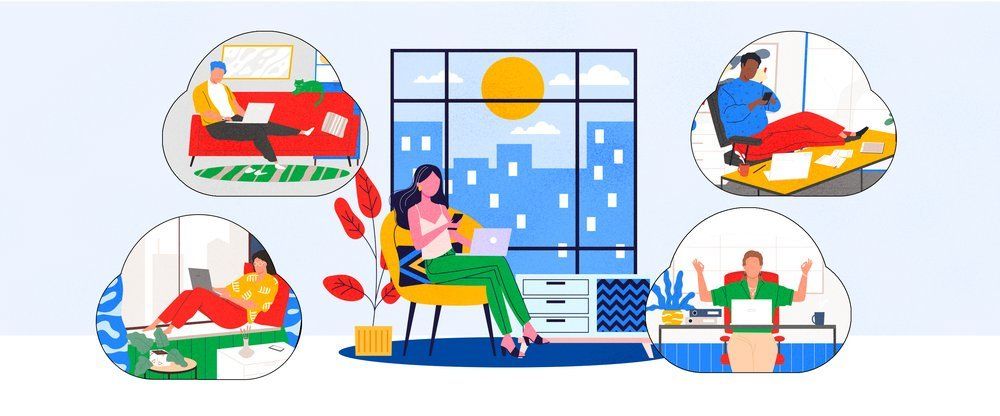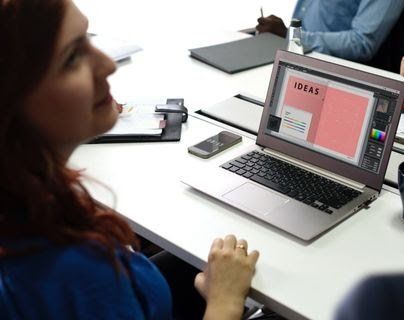The future of computing: no more computers!
There’s nothing like starting off an article with some contradictory double-talk, but in this case, it’s actually true. The Internet is changing the way we access our information, and the methods that we’ve used to access that information for the last 40-or-so years is slowly becoming obsolete.
Right now, most people have a desk either at home or at work, and on this desk they have a laptop or a desktop computer. This computer holds all of their programs, files, photos, music, etc. that they use, and if any of that information needs to be accessed, that computer is the first thing that pops into their mind. “Oh, you should see the pictures my son sent me from his vacation! Come over to my computer and check them out!” Accessing your information is associated with particular place. Some people even have a whole room of their house called “the computer room.” I didn’t get to have my own room when I was younger. In fact, I’m married, own a house, and have children, and STILL don’t have my own room. We really think highly of our computers.
In contrast, look at the way we use a telephone. When you need to make a phone call, the first thing that pops into your mind is not “I have to get home to my ‘phone room’, access my address book, and partake in a communiqué.” People used to think like this in the 1930’s, but as telephone service and technology expanded, we changed the way we thought of telephone communication. Today’s mobile phones can be used from anywhere, you can call anyone from anywhere, and people can contact you from anywhere. People also stopped using the word ‘communiqué,’ which is a bonus. You can’t help but to sound pretentious when saying that word.
A similar evolution is occurring today. The wide-spread availability of wireless networks and high speed Internet has made people realize “If your information were to be stored in a central location out on the Internet, it would always be with you.” This means that no matter what device you’re using: a smart phone, a laptop, a tablet…as long as you have an Internet connection, you have your stuff. This concept is also being expanded to applications and tools. The recent unveiling of the Google Apps Marketplace , the IPad and the IPhone’s success with its Apps store, and even Microsoft’s commitment to moving it’s Office Suite to the web are all proof in the pudding. Software is all going Internet based, and I think it’s going to be the event that finally converts computers into appliances that everyone can easily operate. Your 80-year-old grandmother generally doesn’t have to call technical support to figure out how to install bread in her toaster or how to get ice out of the freezer. This is the same concept: turn it on and it just works.
The point? In the next several years, we’re going to see the computer as we know it become obsolete. A hybrid of the smartphone and a tablet will most likely be carried around to access our “Internet profile.” Nothing needs to be installed on your device (much the same way nothing needs to be installed on your telephone for it to work). It just tells the Internet that you are “you”, and your apps and information become available. Since there’s nothing to install, you won’t have to worry about application errors, system resources, keeping track of installation CD’s. You simply subscribe to an application you want to use and it becomes available in your web browser.
I’ve had experience with using web apps for the last few years, and they are getting better and better. Google’s Gmail is my favorite example of this, as it comes bundled with Google Docs . Docs includes a word processor, a scheduler, a pretty decent spreadsheet tool, and a presentation tool- all of which rival MS Office in their functionality. The magic of Google Doc’s integration with email is the ability to share documents with other people easily. You simply “invite” someone to view, edit, or corroborate something you created, and they have access to it. No more sending attachments that get rejected due to size limits, no more antivirus programs blocking my presentation files, and it makes document sharing so simple! I just heard of a local 8th grade class that uses Google Docs to share homework assignments between the students and the teacher. The students don’t have to worry about forgetting their assignments because they just have to log into their Docs to see them. Unfortunately it makes using the excuse “the dog ate my homework” a bit more difficult to use.
The buzzword for this whole situation is “Cloud Computing.” It is already revolutionizing the way companies conduct business by lowering IT costs, lowering energy costs (no need to keep those pesky servers running on-site!), and increasing employee efficiency. Home users may already be enjoying cloud concepts and not even realize it. Do you use webmail? A photo sharing service? A movie streaming service? These are all excellent examples of cloud applications. Many of these even have non-computer devices to use them. For example, many people receive their email on their smartphone now, have electronic picture frames that display photos from their sharing service, and watch Netflix on their Blu-ray player. A bit further down the road, the smartphone/tablet hybrid devices I mentioned earlier will probably take over these duties, with wireless connections to larger screens when needed. Your device will store your Internet profile, and you can pop any movies, photos, or music you own onto anyone’s TV with the touch of a screen.
The end of the traditional use of a computer is definitely on the horizon. Transitioning to cloud based services may seem daunting at first, but the accessibility and functionality rewards are well worth it. The best part? You’ll be able to reclaim a whole room of your house- no more need for a computer room! Perhaps people will have a “cloud room” in the future. All I know is, I probably still won’t have my own room.







